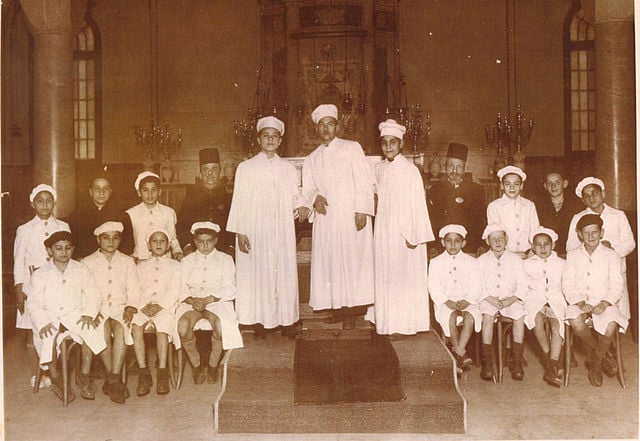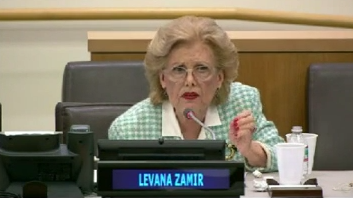
Egyptian Alexandria Jews. Choir of Rabbin Moshe Cohen in Samuel Menashe synagogue. Alexandria. (Nebi Daniel Association public photo collection)
Levana Zamir, President of the International Association of Jews from Egypt, and the Egyptian Jewish community generally suffered greatly as a result of the Arab-Israeli conflict in the wake of the 1948 war. For this reason, Zamir and other members of the Egyptian Jewish community are extremely grateful to U.S. Secretary of State John Kerry for addressing their plight as part of a final status peace agreement with the Palestinians.
“My story begins on May 14, 1948. I was 10 years old. All of a sudden, 10 Egyptian officers burst into our house and opened up every thing. They cut open the mattresses. They did the same to my uncle. They found nothing, but they took him to prison, saying he was a Zionist. My uncle was in prison for 18 months,” Zamir declared. “My father had one of the biggest printing houses in Cairo and it was confiscated. King Farouk declared every Zionist an enemy and they put people in prison, confiscating their assets.”
Her uncle’s imprisonment adversely affected Zamir’s sense of belonging in Egypt as a child: “I didn’t know they took my uncle. But when I arrived in school the next day, the teacher told me that they took my uncle to prison. I cried. I ran to my mother and asked if it is true. She told me that he is not a criminal and he went to prison just because he is Jewish. I understood being a Jew is a crime. I felt like I was a criminal. I felt marginal after that. It was my own trauma.”

In Egypt, Zamir’s family was very affluent and wealthy. They had two servants and a large home.However, after her father’s printing business was confiscated by the government, the servants were fired. Zamir claimed that her parents tried to protect their children from many of their problems. As a result, she is not sure whether the servants were fired for financial reasons or because they were afraid that having Muslim servants could result in them being reported to the authorities.
The sentiment in the streets of Egypt, according to Zamir, drastically changed for the worse as well. “I remember going once to the synagogue on Yom Kippur. It was on Sunday,” Zamir explained. She stated that like many other affluent Egyptian Jews, she studied in a private Christian school in order to grasp numerous languages, and in Christian schools, there is no school on Sunday.
“A friend came with me to the synagogue. I was explaining to her it’s a 24-hour fast of not eating. I told her that you can’t even put a pin in your hair. I told her it is haram (Arabic word for religiously forbidden),” Zamir stated. “A girl from the street then shouted at me, do you know what haram is? Do you know what a sin is? Before 1948, no girl in the street dared to say such a thing. We gave them money and everything. In Egypt, we had relations with the Muslims. The aristocrats were at our level. We were friends with them. For the poor Muslims, we gave them money and they liked to serve us. They expect you to be generous and they serve you with all of their hearts. Then, they dared to shout at us. I didn’t understand why they shouted at us.”
In 1945, on the anniversary of the Balfour Declaration, three synagogues were burnt and many Jewish homes and schools were looted. In June 1948, a few bombs exploded in the Jewish Quarter in Cairo. Many were killed. In September 1948, it happened again in the middle of the day. One local Egyptian Jew knew how to defuse bombs and he did this a few times with much success. “He tried to defuse the bomb, yet he and another lady died,” Zamir stated. However, the lady who called him to the scene succeeded to save many lives by getting Jewish children to flee from the bomb in the Jewish Quarter.
In 1949, the Egyptian Muslim Brotherhood declared that all Egyptian Jews have returned to being under the dhimmi status (a discriminatory Islamic legislation against protected minorities).” The Muslim Brotherhood began persecuting Jews in the streets, as Egyptian officers looked on and did nothing. “They used to beat Jews to death and do nothing,” Zamir related.
After the conclusion of the Israeli War of Independence, 500 Jewish shops would explode in 1952 in Egypt on a day referred to as “Black Shabbat.” Zamir stressed, “It began as an exhibition against the British and it very quickly turned against the Jews. Cairo was burning. The whole Cairo town burned. One of the stores that exploded was a store of munitions. The king was one of the clients of the store. All of Cairo was on fire. It wasn’t nice at that time in Egypt.”
However, despite the tense atmosphere in the streets, there were some Egyptian Muslims who remained loyal to their Jewish friends. Zamir related that one day she came home from school and saw that the Egyptian authorities were auctioning off her house, as well as everything in it. “I cried because I saw they are selling my piano,” she stressed. Yet Zamir’s father had managed to give from his own money to his Arab friends, so they could buy his house and everything in it. As a result, they didn’t lose their possessions until they were expelled from Egypt.
Zamir related that she and her family had Egyptian Muslim and Christian friends that remained loyal to them until the very end, despite the political situation. Furthermore, in one particular bloody incident, Zamir’s teenage brother was beaten up just for being Jewish to the point that he was bleeding. However, he was not killed because a good Muslim friend intervened and professed that he was a devout Muslim, not a Jew. “He saved his life. He was bleeding, but was okay,” she emphasized.
In 1949, Zamir and her family were forcefully expelled from Egypt. Her uncle was released from prison only on the condition that they leave Egypt and her father was instructed by the authorities to join him and his family. “We left in the middle of the night, like thieves,” she stressed. Zamir left behind her beautiful house in Cairo and all of her possessions, in order to live in a crowded refugee camp in France, where her large family consisting of seven children plus two parents was forced to share one room with three other families inside of a military barrack.
However, after Zamir was called a “dirty Jew” by local French children, the family decided to move to Israel. Zamir’s mother felt that even though they would be poorer in Israel, it was much better to live in a place where no one would call her children a “dirty Jew.” In Israel, they spent three years living in a refugee camp consisting of tents. “In the maabarot (refugee camps for Jewish refugees from Arabic speaking countries), it was worse than in France. The tent blew over all the time and all of the rain fell on us.” Her father, who used to have the largest printing business in Cairo, started to work odd jobs that he would have never dreamed of doing before; in the end, he ended up working as a receptionist in a hotel. However, he made these sacrifices for the welfare of his children, who are all highly educated. All of her brothers ended up as either doctors or professors.
Given such a life story, Zamir feels that it is very important that Egyptian Jewish refugees like herself, as well as the other nearly one million Jews who were either expelled or compelled to leave Arabic speaking countries as a result of waves of violent anti-semitism following Israel’s establishment as a state, should be compensated just like the Palestinian refugees. Zamir told JerusalemOnline News,
“All the Presidents of Jews from Arab countries associations, under the roof of our ‘Central Organization of Jews from Arab countries’ — headed by Meir Kahlon, are grateful to John Kerry and Martin Indick, for including the Jews from Arab countries compensations into the Framework-Agreement, as well as the Palestinian’s compensations.”
Zamir is highly critical of Israeli Knesset members who view compensation for Jewish refugees from Arabic countries as a “bribe” to leave the territories, asserting that her people deserve the right to be compensated in the same way that Holocaust survivors are compensated. Zamir stressed that Jewish refugees from Arabic speaking countries have been fighting for compensation as part of a just resolution to the Middle East refugee crisis for years and that now is the time to bring compensation into fruition.